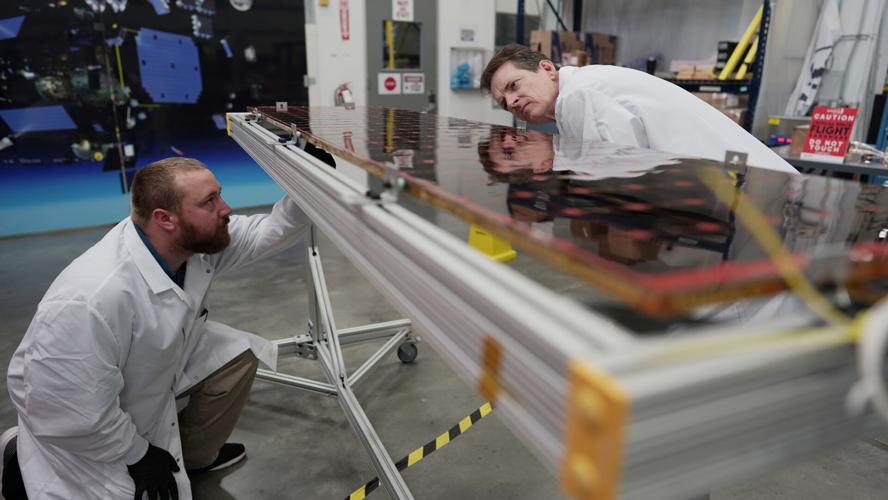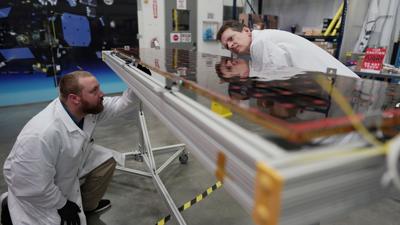A Longview native helped make history this past month when the Houston-based aerospace company he works for, Intuitive Machines, put a private lander on the moon.
It was the first American lander to touch down on the orbiting rock in more than 50 years.
Pine Tree High School graduate Trenton Vaughn, 30, is as an avionics test and subsystems lead at the company.
The private mission was partly funded by a $118 million contract with NASA to pave the way for the agency’s future Artemis campaign, which hopes to return astronauts to the moon.

The Intuitive Machines Odysseus lander is seen inside the Falcon 9 rocket fairing.
On Feb. 15 at Florida’s Cape Canaveral launch facility, the Odysseus, Intuitive Machine’s lander, shot toward the stars on a Falcon 9 rocket operated by SpaceX, the private American rocket company which now ferries the majority of global space cargo.
A mishap during the lander’s Feb. 22 touchdown forced the craft onto its side, but not before achieving a number of milestones, including the first successful demonstration of a propulsion system common on rockets but never seen on a lander.
The Odysseus’ payload of scientific instruments was designed to study the crater-pocked surface of the lunar South Pole and test a space-based data storage system. A copy of the Declaration of Independence was beamed back to Earth during the craft’s seven days of operation.
Vaughn talked with the News-Journal about February’s moon mission, his career arc and the atmosphere inside the Cape Canaveral control room during the launch.
Longview News-Journal: You were in the control room during Intuitive Machine’s historic launch. Tell me about the atmosphere in the room. What’s it feel like to watch hundreds of millions of dollars careening through space in a vehicle you helped prepare?
Vaughn: When you’re in the control room during a launch, it’s a nail biter. That was a crazy experience and the highlight of my career so far. The launch itself was cathartic.
You’re basically watching months of work — of your life — placed on a rocket and shooting out into space. It was just an amazing sight seeing it go up. But all of that was mixed with the stress of the situation, because it’s a fast-paced thing. There’s no margin for error when you’re doing stuff like that.
Then I flew back to Texas and was there to observe the landing.
LNJ: Walk me through how a Pine Tree grad became an electrical engineer on a moon landing mission.
Vaughn: I graduated from Pine Tree in 2012 basically at the bottom of my class and decided I wanted to be an engineer. So I went to (Tyler Junior College) for about a year and a half then transferred to Houston and got my bachelor’s degree in physics.
I had a rough time getting my first job in 2016 after graduating. I worked in East Texas for an oil company for a little bit. But after that, I got my first engineering job in North Dakota and moved up there and worked for about a year-and-a-half and then transferred down to Dallas and got my previous job at Unitron.
But one day, about two years ago, I was contacted by a recruiter, and she basically said, ‘Hey, do you want to help put a robot on the moon?’ I said, ‘Sure.’ So I took the job, and I’ve been working at Intuitive Machines ever since.
LNJ: Why was the lunar South Pole chosen as the landing site for the mission?
Vaughn: So the South Pole has a bunch of craters that have never been touched by the sunlight, and there’s a lot that hasn’t been explored. The hope is that there’s ice, which would mean water resources that can be used if people start colonizing the moon.
But water can also be decomposed into rocket fuels. The energy it takes to launch from Earth to say, Jupiter, is a lot more than the energy it would take to launch from the Earth to the moon, fill up on the moon and then launch to Jupiter from there, as an example.

Intuitive Machines employee Trenton Vaughn, a Longview native, is seen at his control console.
LNJ: What’s NASA looking to get out of its partnership with private space companies like Intuitive Machines?
Vaughn: NASA has the Commercial Lunar Payload Services program. The thought is that NASA, a government agency, is not set up to do missions like what we just accomplished in a very economical way. The private sector is able to take risks and try new things and basically get the same thing done with less money.
LNJ: Did you ever imagine when you were a student at TJC that you would be where you are now?
Vaughn: I figured I’d have a mundane 9 to 5 job. You know, taking kids to baseball practice and yadda yadda. But God had different plans for me. I kinda fell a — backwards into the aerospace business.
LNJ: Any words of advice for our budding aerospace engineers here in Longview?
Vaughn: Mike Rowe, the “Dirty Jobs” TV show guy, has a good quote. He tells you not to follow your passion and to follow opportunities. And my entire career has been me chasing opportunities, even if they’re things that I’d never even considered the day before. That advice somehow led me here.
























